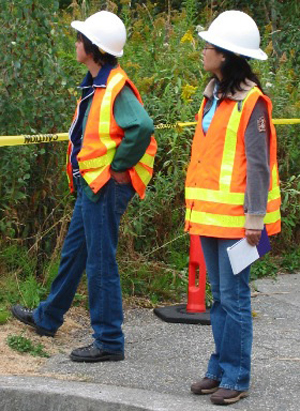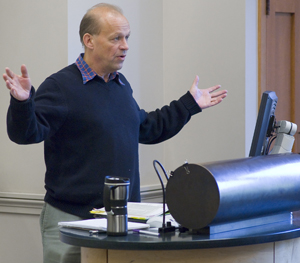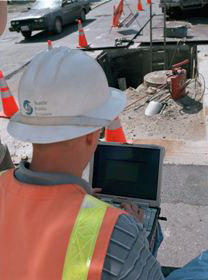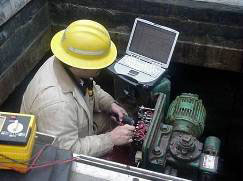|
It takes visionaries to discover how government can be improved with mobile technology.
Over the past three years, the iSchool has combined forces with the City of Seattle Public Utilities to investigate forward-thinking approaches to digital government.
Funded by a three-year National Science Foundation (NSF) grant of $498,000 that ends in October, the Fully Mobile City Government Project (mCity for short) was one of only 10 projects in 2005 to receive NSF funding in the field of digital government. According to Assistant Professor Jochen Scholl, the project’s principal investigator, it was the highest funded single project of its kind in the submission cycle.
“Only four to five percent of the projects in digital government received funding that year and about 200 were rejected,” says Scholl, who came to the iSchool five years ago. (Learn more about Jochen Scholl in the accompanying story.)
Advancing digital government is a delicate mission that involves complex human factors, yet it has an extraordinary capacity to transform the business of government, how that government serves the public and how productively it completes tasks. It’s a slow process, says Scholl, and also an uncharted frontier.
“If you were to show Abraham Lincoln what government can do now, he would be stunned. But it’s all done incrementally, year by year, so the transformation is really quite subtle.
“With digital government research, though, some stubbornly deny there is any transformation. Is it transformative in that it changes the nature of the beast completely? Well, no,” he says.
The goal of mCity is to understand the impact and use of wireless applications in government and to develop a model that can guide other governmental organizations as they implement wireless, mobile technologies.
|
Investigators Scholl and Professor Raya Fidel, as well as iSchool Ph.D. students Monica Liu and Kris Unsworth, have been studying how wireless and mobile technology can improve both government processes and working conditions of field workers in two divisions of Seattle Public Utilities (SPU) – the Drainage and Wastewater Division and the Water Operations Division.
Fully mobile and wirelessly connected applications were already in use in SPU’s GoMobile Initiative. Until recently, though, information and communication technology-enabled field operations at SPU lacked dramatic gains in productivity.
“Seattle Public Utilities is cautious, savvy, knows what it’s doing and needs to move to increase productivity with the same number of field workers,” Scholl says.
Fidel, director of the iSchool’s Center for Human-Information Interaction, which oversees the project, says examining the work of SPU’s field workers has been a vital element of the mCity research. As an information scientist, Fidel was a pioneer who, 30 years ago, recognized the limitations of mathematical models and the need for qualitative analysis where the workers are, in the field.
|
“We’ve looked at the work these very dedicated field workers do, analyzed it, looked at the goals, the constraints they’re facing, the information they need, how they do their jobs and the reasons why they do the work the way they do. You have to examine how the work is assigned and the distribution of responsibilities,” says Fidel.
“What is the knowledge and expertise they bring to the job? What’s required to make them happy? No one had done an in-depth analysis for the purpose of developing a wireless, mobile system for them. It may mean you change the way the work is done, but you don’t change how it affects the social and organizational structure. It means you have to get under their skin and know what they are doing.
“In the end, this is not just for them, though. It’s for other government workers as well. The city has been extremely supportive, but it’s not our job to make the city better. It is our job to investigate and determine how to improve systems for field workers everywhere.”
While the mCity project has not addressed this area directly, SPU indicates some work teams in the field report significant productivity gains and improved decision making.
“Now they can cluster tasks they couldn’t before and eliminate costly extra trips to and from the field,” Scholl says. “They can look at tasks more systematically for easy victories. When you go after it systematically, you can do much more.”
Bob Bleiler, one of SPU’s technology specifiers in the Technology Systems Management Division, has been working closely with mCity project investigators.
“It’s fair to say there has been a substantial increase in productivity,” Bleiler says. “We’ve also greatly increased the use of mobile technology since the project started.”
|
Scholl says SPU’s field workers have an invaluable institutional memory and a tremendous amount of tacit knowledge, which also means their range of sensory information isn’t easy to store. Workers might use smell or taste when troubleshooting a water utility problem, for example.
“For them, it’s like the nuances of wine tasting,” Scholl says with a smile. “This is why it is difficult to build information systems that really support people effectively.
“Workers in the field are on a mission. They’re proud of what they are doing. They know the system would break down without them.”
Bleiler had been the technology project manager responsible for SPU’s first mobile effort, which launched three years before the mCity project began. He says the lack of robust technology hampered SPU’s earliest ventures with wireless systems.
“It was doable and usable, but not wonderful to use in the field. Now just the wireless connectivity makes the mobile units dramatically more usable,” he notes.
The original hand-held mobile units functioned at about a fifth the speed of a dial-up Internet connection, says Bleiler. Not exactly fun to use. Today’s mobile units provide field workers with the equivalent of a digital subscriber loop/line (DSL) connection, he says, for a huge improvement.
As a result of mCity, SPU workers now receive more training in the use of mobile units.
“We’re paying attention to what was brought to light in interviews with our field workers and we’re seeing the benefits,” Bleiler says. “We’re also capturing some of that institutional knowledge that we know will walk out the door with an aging workforce. We’re dealing with people who are not technologically savvy and are used to doing things the old way as well as young recruits who were born with technology.
“In the end, we’re in the business of fixing pipes, so we have to ensure that the technology doesn’t become too complex or too interesting that it overshadows the work.”
Bleiler pondered the notion that it takes visionaries to develop mobile government.
“In the early days, our vision was much the same as it is today,” he says. “The difference now is that technology has caught up and has made that vision possible to achieve.”






